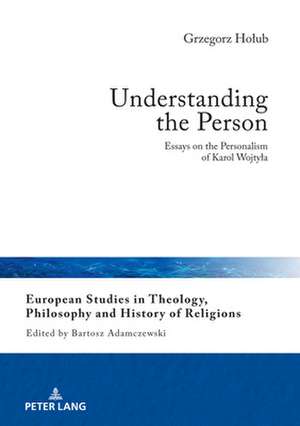Understanding the Person: European Studies in Theology, Philosophy and History of Religions
Autor Grzegorz Holuben Limba Engleză Hardback – 17 iun 2021
Din seria European Studies in Theology, Philosophy and History of Religions
- 23%
 Preț: 465.55 lei
Preț: 465.55 lei - 8%
 Preț: 448.01 lei
Preț: 448.01 lei -
 Preț: 408.72 lei
Preț: 408.72 lei - 23%
 Preț: 473.56 lei
Preț: 473.56 lei - 23%
 Preț: 456.40 lei
Preț: 456.40 lei -
 Preț: 519.06 lei
Preț: 519.06 lei - 23%
 Preț: 535.05 lei
Preț: 535.05 lei - 23%
 Preț: 453.18 lei
Preț: 453.18 lei - 23%
 Preț: 460.72 lei
Preț: 460.72 lei -
 Preț: 494.10 lei
Preț: 494.10 lei - 23%
 Preț: 451.30 lei
Preț: 451.30 lei -
 Preț: 521.34 lei
Preț: 521.34 lei - 23%
 Preț: 452.36 lei
Preț: 452.36 lei -
 Preț: 458.22 lei
Preț: 458.22 lei - 23%
 Preț: 528.18 lei
Preț: 528.18 lei - 23%
 Preț: 567.30 lei
Preț: 567.30 lei - 8%
 Preț: 450.88 lei
Preț: 450.88 lei - 23%
 Preț: 525.50 lei
Preț: 525.50 lei -

Preț: 455.54 lei
Nou
Puncte Express: 683
Preț estimativ în valută:
87.18€ • 90.68$ • 71.97£
87.18€ • 90.68$ • 71.97£
Carte tipărită la comandă
Livrare economică 15-29 aprilie
Preluare comenzi: 021 569.72.76
Specificații
ISBN-13: 9783631854235
ISBN-10: 3631854234
Pagini: 178
Dimensiuni: 148 x 210 mm
Greutate: 0.41 kg
Editura: Peter Lang Copyright AG
Seria European Studies in Theology, Philosophy and History of Religions
ISBN-10: 3631854234
Pagini: 178
Dimensiuni: 148 x 210 mm
Greutate: 0.41 kg
Editura: Peter Lang Copyright AG
Seria European Studies in Theology, Philosophy and History of Religions
Notă biografică
Grzegorz Holub is professor of philosophy at the Department of Philosophy of the Pontifical University of John Paul II in Kraków, Poland. His area of research includes ethics, bioethics and the philosophy of the human person.
Cuprins
- Introduction
- Towards the Philosophy of the Human Person
- How to Know the Person?
- The Structure of the Person
- The Person and His Faculties
- The Person in Action
- The Dignity of the Person
Descriere
The book deals with the concept of the person present in the personalism of Karol Wojtyla. It advances some main topics necessary to understand the theory of the person developed within European continental philosophy, especially in a specific connection of Thomism and phenomenology.
